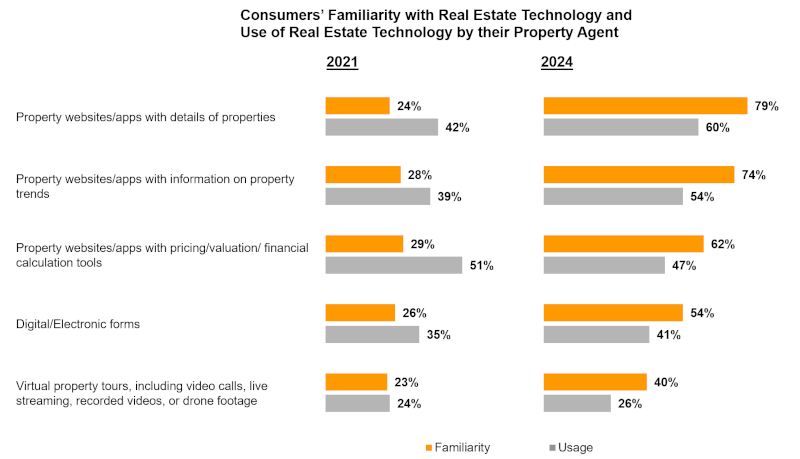CEA’s Public Perception Survey (PPS) 2024 gave us interesting and useful insights about what property consumers expect of their real estate salespersons (RESs) they engage.
As shared in the earlier CEAnergy article about the PPS 2024, the survey, conducted every three years, helps us better understand what consumers and potential consumers perceive of estate agents (EAs) and RESs.
The findings offer useful insights for CEA to support the real estate agency industry’s efforts to enhance the professionalism of RESs and protect the interests of property consumers.
Property consumers are increasingly savvy
Many property consumers are aware of what to do when it comes to engaging an RES for a property transaction.
For example, almost 8 out of 10 consumers are aware that the RES commission is negotiable. Out of these consumers, 85% negotiated the commission to be paid. In line with these findings, property consumers and RESs are encouraged to negotiate a commission that both parties agree upon on, before starting work on the property transaction.
The majority of consumers surveyed (82%) are also aware of the fact that they are encouraged to sign the relevant CEA Prescribed Estate Agency Agreement with the RES that they intend to engage for residential property transactions, with the aim of reducing potential disputes.
Quick explainer: The Prescribed Estate Agency Agreement is a contractual agreement between the consumer and the Estate Agent (EA) that a RES is registered with. It is a binding contract that protects the interests of both parties and reduces potential disputes over the RES’ roles and responsibilities.
It is encouraging to note that 88% of consumers were asked by their RESs to sign the CEA Prescribed Estate Agency Agreement – with almost two in three of these consumers being asked to do so before the RES had started work.
Verifying RESs through CEA’s Public Register
7 in 10 consumers shared that they have used the CEA Public Register to verify RESs before engaging one. This is a positive trend, as verifying the identity of an RES – using his/her mobile number – is a critical step that will help consumers to avoid falling victim to rentals scams.
Tip: Using the CEA Public Register is a key mitigating measure, but not the only one. In addition, consumers should also view the property with the CEA-registered RES in person. They should also not make any payment before viewing the property.
Find out more on how to identify and protect yourself from property rental scams.
Consumers’ increased familiarity with digitalisation
Compared to the 2021 survey, property consumers reported that they are now more familiar with the different types of real estate technology.

More property consumers have also indicated that the RES or EA they engaged are using various forms of real estate technology, as compared to the 2021 survey, including:
- Websites or apps with details of properties or information on property trends
- Pricing, valuation or financial calculation tools
This could be attributed to increased technology investments and adoption by the real estate agency industry, and higher usage by RESs over the last three years since the previous survey.
Examples include RESs creating videos and live streaming properties, tapping on data analytics tools to understand property transaction trends, creating marketing websites, and tapping on applications – to calculate property valuation and client financials – to provide better advice to their clients.
Supporting the industry to raise its professionalism
It is clear from the PPS results that the real estate agency industry must keep up with rising expectation of property consumers, especially through the greater use of technology and professional upskilling.
To support RESs in raising their professionalism and enhancing the quality of Continuing Professional Development (CPD) training, CEA has started – since September 2024 – to progressively implement the eight recommended measures put up by the joint CEA-Industry workgroup under Project ADEPT to enhance the CPD ecosystem for the real estate agency industry.
These measures include higher CPD requirements for registration renewal, training requirement in prescribed essential topics, enhancing the course accreditation and trainer requirements for better course designs, and improved class engagement activities.
CEA will continue to work closely with our industry partners, including EAs and industry associations, to raise standards in the industry and to give consumers greater confidence when carrying out a property transaction through an RES.
Information accurate as at 8 July 2025